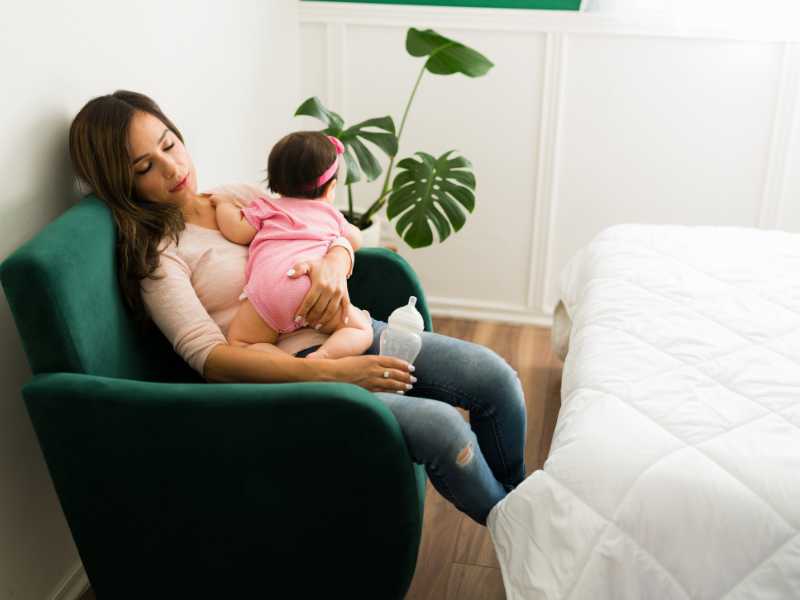Are you a new mom striving to overcome the early stages of child birth, you are in the right place, we have put together 17 proven ways on how to survive the newborn stage that will help you navigate each stage.
The newborn stage is a beautiful, tiring, life-altering period that can leave even the most prepared and ready parents feeling overwhelmed and confused in most cases.
There are nights when you don’t sleep, the baby keeps crying, the need to change diapers and then you feel like you will be through with everything every hour but then it just keeps coming up.
Surviving this stage requires a whole lot of strength, patience and plenty of grace, it is not about sentiments or settling with the “enjoy every moment while it lasts’ that friends and families will always tell you.
If this is your present situation or soon to be, know that you are not alone in the journey, it is just a phase that will pass away and it does get better.
How to Power Through the Newborn Stage: Real Talk for Exhausted Moms
1. Sleep When the Baby Sleeps (No, Really)

You’ve heard it before but it’s repeated for a reason.
In the newborn stage, your baby’s sleep schedule is all over the place, which means your own rest becomes fragmented. Instead of using every nap time to catch up on chores or scroll through your phone, try to lie down, even if it’s just to rest your eyes.
Short naps throughout the day can add up and leave you feeling more functional than you expect. The dishes will still be there, your well-being is priority number one.
2. Lower Your Expectations (Give Yourself Grace)
 Forget the Instagram-perfect home and gourmet meals.
Forget the Instagram-perfect home and gourmet meals.
During this time, your main job is to care for your baby and yourself.
Let go of perfectionism. If all you did today was feed the baby and brush your teeth, you’ve done enough.
Learning to adjust your expectations helps protect your mental health and allows you to focus on what really matters, connection, bonding, and healing.
This is one of the safest ways on how to survive the newborn stage everyone mom should look into.
3. Accept Help (Say Yes to the Village)
 Whether it’s family, friends, or neighbors—when someone offers support, say yes.
Whether it’s family, friends, or neighbors—when someone offers support, say yes.
Let them bring over meals, take out the trash, or rock the baby while you take a nap.
Don’t worry about appearances or feeling like a burden.
People who love you want to help, and this stage wasn’t meant to be survived alone.
4. Keep Easy Snacks and Water Within Reach
 Feeding a newborn, whether breast or bottle can feel like a full-time job.
Feeding a newborn, whether breast or bottle can feel like a full-time job.
Having protein bars, trail mix, fruit, or crackers within arm’s reach helps you stay nourished when getting up to cook isn’t an option.
Keep a large water bottle close too, especially if you’re breastfeeding, which can dehydrate you quickly.
5. Create a Simple Routine, Not a Schedule
 Newborns thrive on predictability, but they don’t follow clocks.
Newborns thrive on predictability, but they don’t follow clocks.
Instead of stressing over wake windows and feeding times, aim for a gentle routine like: wake, feed, change diaper, play/snuggle, sleep.
This flow brings comfort and consistency without the pressure of rigid time slots.
6. Swaddle, Soothe, Repeat
 Soothing techniques are game changers.
Soothing techniques are game changers.
Try swaddling, white noise, bouncing, rocking, or offering a pacifier.
Newborns are adjusting from the cozy, noisy womb, and these methods mimic that environment.
Find what calms your baby best and use it consistently to create a sense of safety.
7. Limit Visitors if You Need To
 While everyone wants to meet the baby, too many visitors can quickly become overwhelming.
While everyone wants to meet the baby, too many visitors can quickly become overwhelming.
It’s perfectly okay to set boundaries. Politely let people know when you’re not up for company, and focus on bonding as a family.
Remember, rest and recovery come first—not entertaining guests.
This is one of the effective ways on how to survive the newborn stage you should consider.
8. Practice Safe Co-Sleeping (If You Choose To)
 Some parents find they get more sleep when the baby is close.
Some parents find they get more sleep when the baby is close.
If you choose to co-sleep, research safe sleep practices, like a firm mattress, no pillows or blankets near the baby, and keeping the baby on their back.
Following guidelines from trusted sources like the American Academy of Pediatrics is key to doing it safely.
9. Use a Baby Carrier for Hands-Free Bonding
 A soft wrap or structured carrier allows you to keep baby close while freeing up your hands to do light tasks, or just stretch your legs.
A soft wrap or structured carrier allows you to keep baby close while freeing up your hands to do light tasks, or just stretch your legs.
It also provides a soothing experience for babies, who love the sound of your heartbeat and movement. It’s a win-win for closeness and convenience.
10. Don’t Compare Your Baby or Yourself
 Every baby is different. Just because someone else’s baby sleeps through the night at six weeks doesn’t mean yours should.
Every baby is different. Just because someone else’s baby sleeps through the night at six weeks doesn’t mean yours should.
Avoid the comparison trap, especially on social media. What works for one family may not work for yours, and that’s okay.
Trust your instincts and stay focused on your own unique path.
11. Take Care of Your Mental Health
 The newborn stage can be emotionally intense.
The newborn stage can be emotionally intense.
If you’re feeling persistently sad, anxious, or detached, don’t brush it off. It could be postpartum depression or anxiety, which are both treatable.
Talk to your healthcare provider, seek counseling, or join a support group. Prioritizing your mental health isn’t selfish, it’s essential.
12. Keep Nighttime Interactions Low-Key
 At night, keep the lights dim, your voice soft, and interactions minimal.
At night, keep the lights dim, your voice soft, and interactions minimal.
This helps babies learn the difference between day and night.
Avoid stimulating activities or loud noises during nighttime feeds to encourage babies to go back to sleep more easily, and give you a better shot at sleep too.
13. Share the Load with Your Partner
 If you have a partner, open communication is key.
If you have a partner, open communication is key.
Take turns with tasks like changing diapers, burping, or nighttime feeds (if bottle feeding).
Even if one partner returns to work while the other stays home, the mental and physical toll of newborn care needs to be shared.
14. Plan for the Bare Minimum in a Day
 Your to-do list needs to shrink, for now. Instead of five errands or projects, pick one thing you’d like to accomplish.
Your to-do list needs to shrink, for now. Instead of five errands or projects, pick one thing you’d like to accomplish.
Maybe that’s taking a shower or folding one load of laundry.
When the pressure is off, you’re more likely to succeed and feel productive without the burnout.
15. Celebrate Milestones—Even Tiny Ones
 Your baby smiled. You drank your coffee while it was still warm.
Your baby smiled. You drank your coffee while it was still warm.
You both got dressed. Celebrate it all.
Acknowledging the small wins helps boost morale and reminds you that you’re moving forward, one beautiful, messy step at a time.
This is one creative ways on how to survive the newborn stage you should copy.
16. Stay Connected to the Outside World
 It’s easy to feel isolated, especially during the early days.
It’s easy to feel isolated, especially during the early days.
Make time for connection, even if it’s just a quick check-in with a friend, a scroll through a supportive parenting group, or a short walk outside.
You’re still you, and staying connected can help you feel grounded.
17. Remind Yourself: This Stage Is Temporary
 The newborn stage can feel like forever when you’re in the trenches, but it really is just a season.
The newborn stage can feel like forever when you’re in the trenches, but it really is just a season.
Soon, your baby will sleep longer, cry less, and interact more.
Try to savor the sweet moments and know that the tough ones won’t last. You’re doing better than you think.
SAFE SLEEP PRACTICES FOR NEWBORNS
1. Place Baby on Their Back to Sleep—Always
 Newborns should be laid on their back for every sleep, whether it’s a nap or nighttime.
Newborns should be laid on their back for every sleep, whether it’s a nap or nighttime.
Side or tummy sleeping significantly increases the risk of SIDS.
Once your baby can roll both ways on their own (usually around 4–6 months), it’s safe to let them sleep in their preferred position, but always start them on their back.
2. Use a Firm, Flat Sleep Surface
 Your baby should sleep on a firm mattress covered with a fitted sheet.
Your baby should sleep on a firm mattress covered with a fitted sheet.
No plush surfaces, no memory foam, and definitely no adult beds or couches.
Cribs, bassinets, or play yards that meet current safety standards are ideal.
3. Keep the Crib or Bassinet Empty
 That means no pillows, blankets, bumpers, stuffed animals, or toys.
That means no pillows, blankets, bumpers, stuffed animals, or toys.
These items may seem cozy or cute, but they pose serious risks of suffocation or overheating.
Your baby only needs their body and a snug swaddle or wearable blanket (like a sleep sack) to be safe and warm.
4. Share a Room, Not a Bed

It’s recommended that babies share your room (in their own crib or bassinet) for at least the first 6 to 12 months.
This reduces SIDS risk while making night feeds easier.
Bed-sharing, even accidentally, can be dangerous, especially on soft mattresses, with loose blankets, or if you’re overly tired.
5. Avoid Overheating
 Dress your baby in light, breathable layers and keep the room temperature comfortable for a lightly clothed adult (about 68–72°F or 20–22°C).
Dress your baby in light, breathable layers and keep the room temperature comfortable for a lightly clothed adult (about 68–72°F or 20–22°C).
Signs of overheating include sweating, flushed cheeks, and a hot chest.
A wearable blanket is a safer alternative to loose covers.
6. Offer a Pacifier at Nap and Bedtime (Optional)
 Studies show that offering a clean, dry pacifier during sleep times may reduce SIDS risk.
Studies show that offering a clean, dry pacifier during sleep times may reduce SIDS risk.
If you’re breastfeeding, it’s usually best to wait until breastfeeding is well established (around 3–4 weeks) before introducing one.
7. Avoid Smoking and Exposure to Smoke
 Exposure to smoke during pregnancy and after birth dramatically increases the risk of SIDS.
Exposure to smoke during pregnancy and after birth dramatically increases the risk of SIDS.
Make sure no one smokes around the baby, in your home, or in your car.
8. Keep Baby’s Head and Face Uncovered
 Make sure your baby’s head stays clear of blankets, hats, or any loose fabric while sleeping.
Make sure your baby’s head stays clear of blankets, hats, or any loose fabric while sleeping.
Their airway should always be free and clear for safe breathing.
9. Be Cautious with Devices and Products
 Avoid using unregulated or non-recommended sleep products like inclined sleepers, positioners, or loungers.
Avoid using unregulated or non-recommended sleep products like inclined sleepers, positioners, or loungers.
Even if something is marketed for sleep, that doesn’t mean it’s safe, check with pediatric guidance before use.
10. Practice Tummy Time—But Only While Awake
 Tummy time is essential for development and helps prevent flat spots on the head, but it should always happen while your baby is awake and supervised.
Tummy time is essential for development and helps prevent flat spots on the head, but it should always happen while your baby is awake and supervised.
Never put your baby on their tummy to sleep.
The newborn stage can feel like both the longest and shortest season of your life, sleepless nights, endless feedings, and emotional ups and downs.
But take a breath and remember: you’re not alone, and you’re not failing.
Every diaper changed, every tear wiped, and every sleepy snuggle is part of building a beautiful bond with your baby.
It’s okay to ask for help. It’s okay to feel overwhelmed. And it’s absolutely okay to take care of yourself too.
Surviving this stage doesn’t mean having it all figured out, it means showing up with love, patience, and grace, even when you’re running on fumes.
So give yourself credit, mama (or papa) you’re learning, growing, and doing the most important job in the world. And trust me, you’re doing it with more strength than you know.
This article has shown you 17 effective ways on how to survive the newborn stage.
|
ReplyForward |